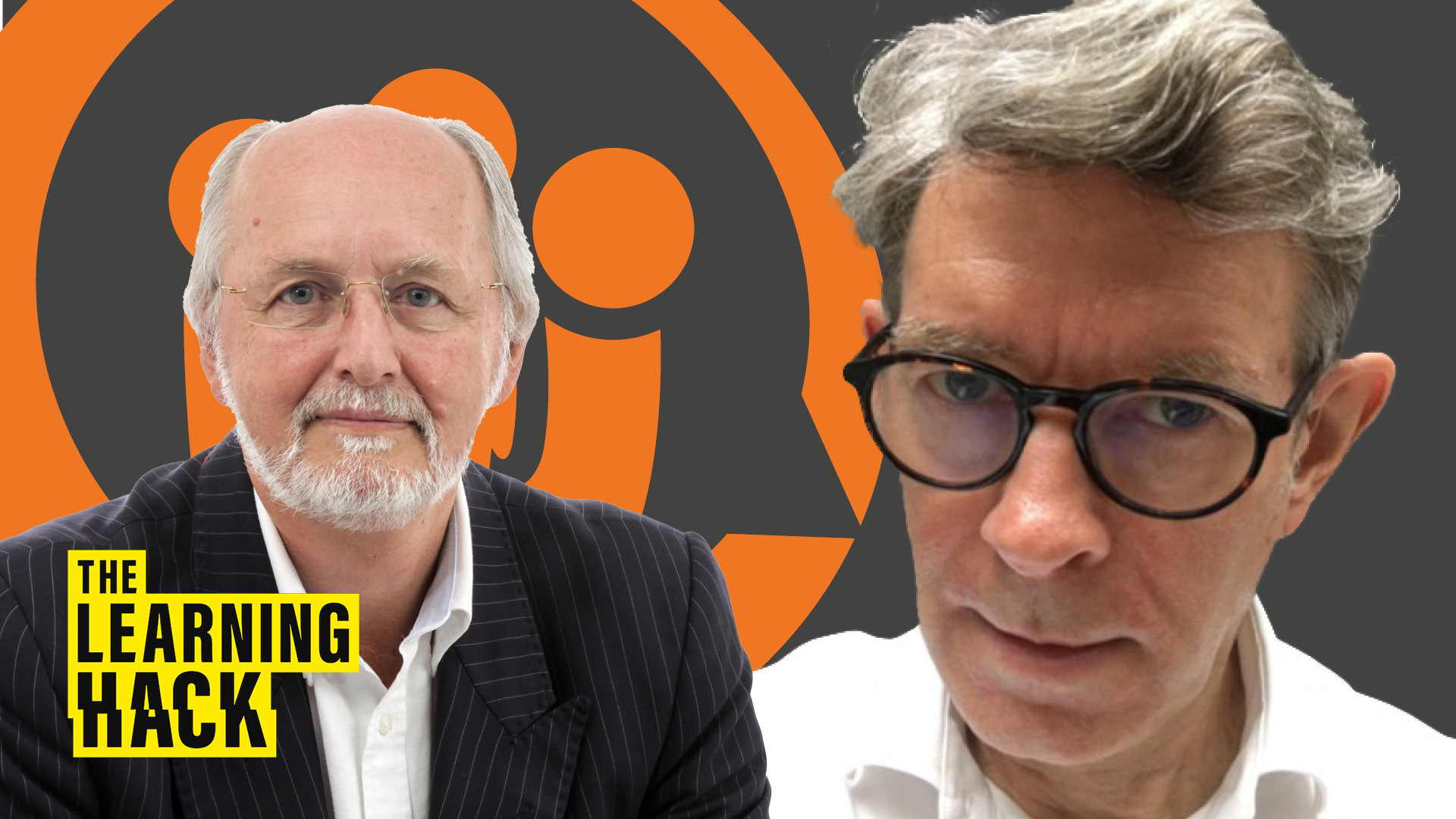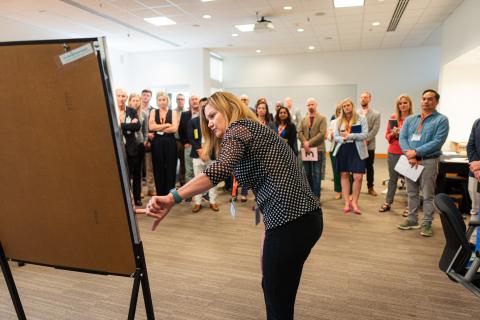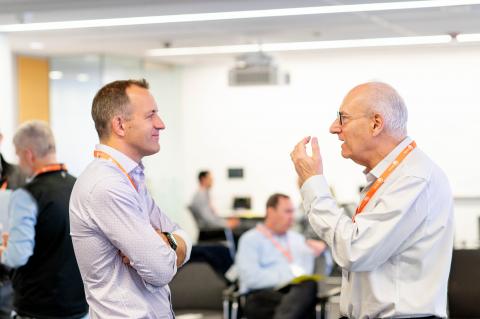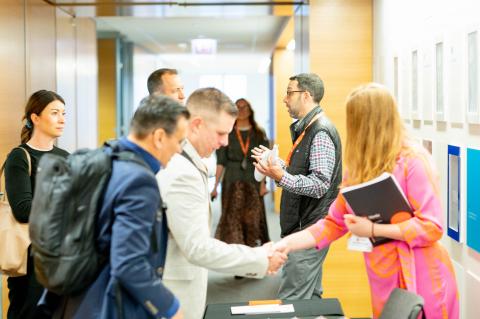Submitted by Kerry Summers on
The advent of generative AI has sparked widespread discussions across industries, but for Learning and Development, its potential remains a double-edged sword.
On the one hand, for many leaders, AI promises to revolutionise the way learning is designed and delivered. On the other, it risks reinforcing old habits and hindering meaningful change.
In a recent episode of The Learning Hack Podcast, hosted by John Helmer, guest Charles Jennings— iVentiv Advisory Board member, regular iVentiv Event Chair, pioneer in L&D transformation, and Co-Founder of the 70:20:10 framework—offered deep insights into these challenges.
This blog unpacks the key themes from their conversation and asks how can L&D leaders avoid complacency? How can they leverage AI responsibly? How can they refocus on performance improvement over outdated methodologies?
AI, Transformation, and Opportunities for L&D Leaders
Generative AI holds transformative potential for L&D, offering opportunities to innovate through digital assistants, performance support, and personalised learning. Yet, as Charles cautioned, there’s a danger of falling into what he terms the “faster horses syndrome.”
What does that mean? “Much of the rush to deploy AI in L&D is centred on faster courses,” Charles explained. “We’ve seen enough content-rich, experience-poor learning solutions to know that’s not the best use of AI.”
Generative AI excels at repurposing existing knowledge but struggles to create genuinely new ideas or solutions, he says. Charles likened AI’s capabilities to a “next-word guessing engine,” emphasising that while it can support innovation, true invention—the light-bulb moments that drive progress—remains uniquely human.
Both John and Charles argued that AI should not just replicate traditional methods faster. Instead, L&D leaders should use it as a “crowbar” to break out of the box of conventional thinking. For example, employ AI to enhance real-time performance support or foster deeper collaboration across teams, rather than merely automating content creation.
The Skills Obsession and Leadership Development
One of the more provocative arguments Charles made was against the current “skills obsession” in L&D. While acknowledging that skills are important, he argued that they are not the ultimate drivers of high performance.
“The idea that we can map every skill to a job role and then plug people into learning pathways assumes we can drive excellence through formal learning alone,” Charles said. “But expertise doesn’t emerge from a skills-based training course. It’s developed through experience, reflection, and collaboration.”
Experts argue that over-reliance on skills taxonomies and rigid frameworks often results in costly, resource-intensive exercises that fail to deliver lasting impact. Charles shared a personal anecdote about a time when 17 members of his L&D team were tasked with mapping job roles to skills—an effort that proved overwhelming and largely unproductive.
A top tip for leaders: shift the focus from skills frameworks to fostering environments where employees can build expertise. This involves blending formal learning with opportunities for on-the-job learning, mentorship, and knowledge-sharing within teams.
Performance-First Mindsets
At the heart of Charles’ philosophy is a call for L&D to adopt a performance-first mindset. Too often, he argued, L&D remains stuck in a schooling paradigm—focused on knowledge transfer and curriculum delivery—while neglecting the systemic factors that enable performance.
Referencing Gary Rummler’s assertion that “98% of performance gaps are caused by organisational barriers, not knowledge deficits,” Charles emphasised the importance of looking beyond individual learning needs. Instead, L&D should align efforts with organisational outcomes, addressing factors like process clarity, leadership effectiveness, and the availability of the right tools.
“When we have a performance mindset, we start with the desired business outcomes,” Charles explained. “We then identify the critical tasks needed to achieve those outcomes and address the systemic barriers that may exist.”
Pivoting From an Individual-Centric Approach to One That Prioritises Teams
Charles also highlighted the need to pivot from an individual-centric approach to one that prioritises teams. While HR’s traditional focus on individual skills and behaviours has shaped much of L&D’s agenda, organisational success often hinges on team performance.
“Senior business leaders aren’t concerned with whether John or Jane is competent; they care about what their teams are producing,” Charles argued. “The team is the atomic unit of delivery, and L&D needs to think about how to support team effectiveness.”
This shift doesn’t mean abandoning personalisation, Charles said. Instead, technology can enable both individual and team development. For instance, AI-driven analytics can identify team-wide skill gaps while fostering collaboration and shared learning experiences.
The Danger of L&D Complacency
Throughout the podcast, Charles expressed concern about L&D’s historic resistance to change. “L&D doesn’t have a great track record of being at the forefront of innovation,” he admitted. Yet, he sees opportunities for the profession to evolve, particularly through better use of AI and a stronger focus on outcomes.
Charles urged L&D leaders to challenge the status quo and embrace new approaches, quoting his late colleague Jay Cross: “Conversation is the stem cell of learning.” Whether through peer discussions, collaborative technologies, or events like iVentiv’s Executive Knowledge Exchanges, the path to progress lies in sharing ideas and questioning established norms.
Charles’ advice for leaders: avoid complacency by actively seeking out diverse perspectives and experimenting with innovative practices. L&D, he says, must position itself as a strategic partner within the organisation, not a siloed function.
From Learning to Performance
AI, performance, and the problem of complacency present both challenges and opportunities for L&D leaders. As Charles articulated, the key to navigating this landscape lies in shifting from a learning mindset to a performance mindset, moving beyond skills frameworks, and embracing team-centric approaches.
Generative AI, as many leaders in the L&D space attest, can be a powerful tool in this transformation, but only if used thoughtfully. By focusing on outcomes, breaking free from traditional methods, and fostering a culture of continuous improvement, L&D can not only stay relevant but also drive meaningful impact across organisations.
Watch this episode of The Learning Hack Podcast on YouTube now.
John Helmer is a writer, podcaster and communications strategy expert specialising in the fields of learning, training and education, with a particular focus on digital technology innovation. He runs two highly successful podcasts, The Learning Hack and Great Minds on Learning. He has led many programmes bringing together thought leaders and practitioners for knowledge sharing and debate, and writes for and edits numerous blogs, as well as producing many white papers and research reports
Charles Jennings is the Co-Founder of the 70:20:10 Institute and leading practitioner in innovative talent, learning, and performance approaches. As respected author and speaker, Charles is particularly known for his work with the 70:20:10 model and its use in helping to re-focus L&D's efforts beyond formal training. Charles was Event Chair at iVentiv's first session in 2009 and has since played a pivotal role in the direction and development of the business both as Chair of the iVentiv Advisory Board and regular contributor.










